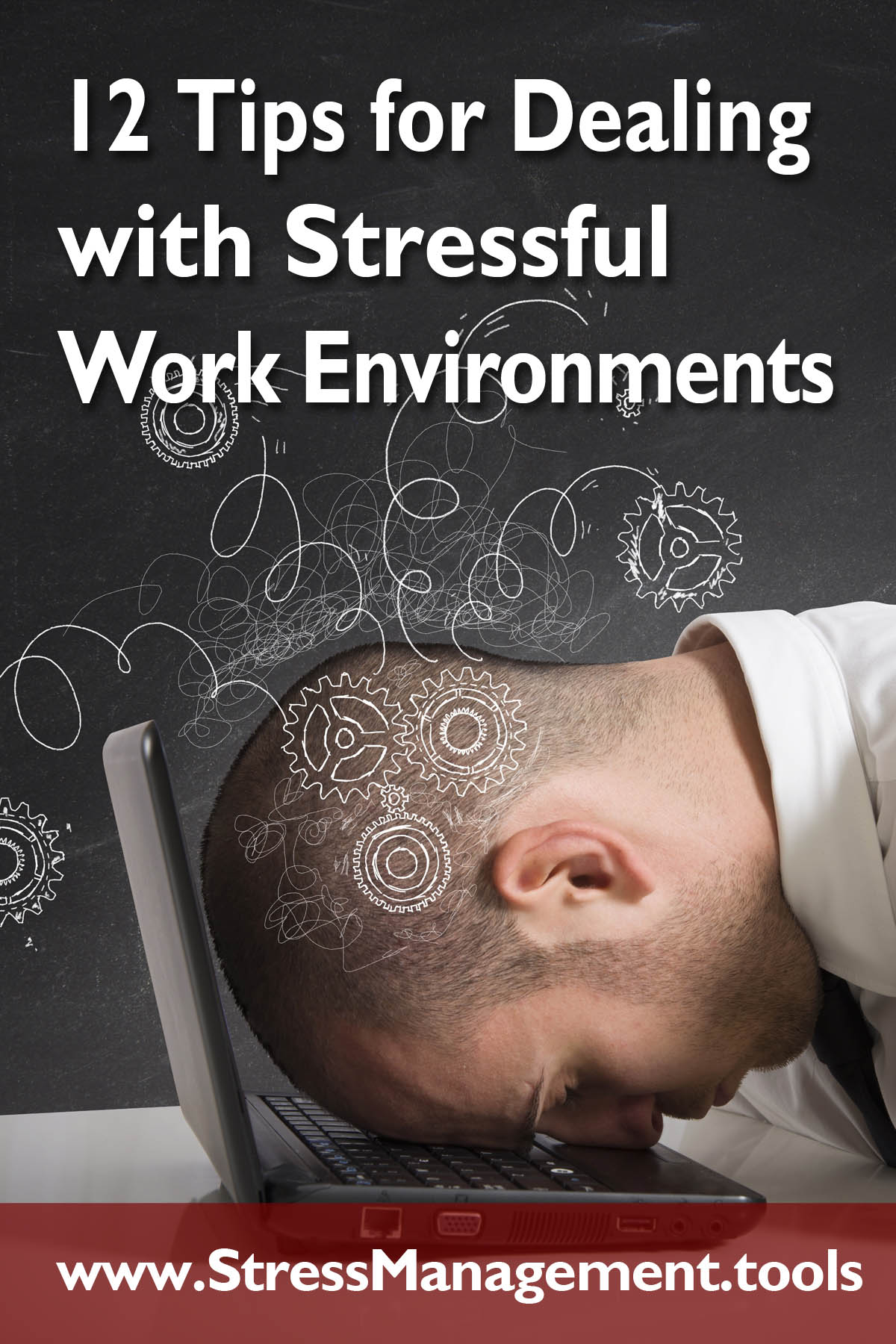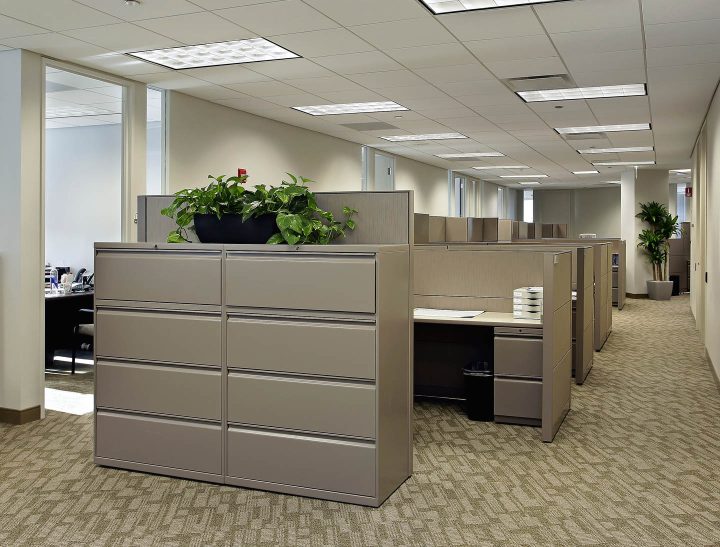Do you dread getting out of bed every day to go to work because your work environment is too stressful? You are not alone. 75% of employees believe that workers have more on-the-job stress than a generation ago. 62% of US workers reported having high levels of stress, involving extreme fatigue or feeling out of control. And working women tend to report higher stress levels than men.1)All statistics from: Workplace Stress. American Institute of Stress

For many it is not only the excessive workload that causes them stress, but also people issues and the work environment. You may find that the people you work with are intolerable or that the setup of your workplace is simply not conducive to getting things done efficiently. Dealing with stressful work environments is something many of us have to face every day, but you don’t have to let it get you down. Instead, by learning how to deal with your stress at work you’ll be able to boost your energy and reduce frustration.
How to Deal with Stressful Work Environments
Establish a stress-reducing morning routine. When you drown a coffee in the morning, rush your kids to school, and face the traffic madness on the way to work, probably you are already stressed before starting your work. Be sure you get up early enough to eat a substantial and healthy breakfast, do your household duties without stress, and ideally get some form of exercise, even if it is a few minutes walking around the block before you slip through the office door.
Create a daily to-do list. Many times, when we are stressed out, it’s because we are not clear on what needs to be done, and important tasks may even fall through the cracks so they need to be done under time pressure. This causes our stress levels to rise quickly and uncontrollably. When you create a to-do list, it won’t matter how hectic the office gets, you’ll have a list in front of you that’ll remind you what needs to get done for that day. You’ll feel more in control when you organize your day and you’ll be able to find some peace in the chaos surrounding you.
Be clear about your priorities. Having a to-do list is a good start, but having too many items on the list is often a source of stress. Figure out every morning what are the priorities that need to get done and focus on the most important task of this list. Don´t worry about the other items on the list, you are not supposed to finish it all in one day. If your supervisor defines your schedule, check in to figure out the priorities that are most important for the day. Being clear on the priorities makes you fret less about the secondary tasks.

Practice good time management. Efficiently manage your time by setting realistic deadlines and avoiding procrastination. If you are a perfectionist, you may fall for the temptation to spend too much time on a task to get it perfect and neglect some other things in the process that get undone for lack of time. Estimate how much time you want to spend on every task, and once the time is over, look at how you can wrap it up. Sometimes we underestimate the work involved and will need some extra time, but if you are tempted to spend your time in an endless routine of polishing your work, step back for a minute and remind yourself about the other tasks that need your attention, so you do not lose out on the big picture. Be sure to schedule your jobs well ahead of their deadlines, so you do not need to accomplish them under stressful time pressure.
Take short breaks. When we are under pressure, we often think that breaks are a luxury we cannot afford. We are trying to push through the day, but pretty soon stress is piling up until we are losing our minds. Actually, we will be much more productive when scheduling some regular 5-minute breaks in a 40 to 60 minute interval. Take just a moment to get up, walk around the block, watch the birds outside the window, or get a glass of water. Then you get back to work with new energy and a concentrated mind. Soon you will realize how you can handle your workload with ease.
Detach and recover after work. Work stress tends to pile up throughout the day, and long after we have left through the office door, the work challenges are still ruminating in our minds. We can break the cycle and engage in a recovery activity right after work. Listen attentively to music on your way home. Classical music will be especially effective since it involves you mentally. Get out into nature and actively observe your environment. Watch a squirrel finding a nut or a duck caring for her chicks. Engage in a hobby when coming home, and as paradox as it seems, the more engaging and demanding the free time activity you choose, the better you can recuperate from work stress. And resist the temptation to take work home or to answer work emails in the after-hours.
Avoid distractions and multitasking. Sometimes we think the more projects we handle at the same time, the more we will get done. Actually, exactly the opposite is true. Trying to divide the attention between two tasks is a surefire recipe for becoming inefficient. Our minds are simply not made to process two things at the same time. For maximum performance, we need to concentrate on the task at hand. Get your to-do list and determine the most important task to tackle first. Then you do not touch anything else until the task is done. Be sure to switch off your cell phone and the “You´ve got mail” alerts. Let your co-workers know that you need some distraction-free time. As soon as you have got your focus on the job, go for it with all your attention.
Establish healthy boundaries. If you are known for taking on the challenges of everybody else in the company, it is a surefire way to get burnout. People get lazy if they know there is somebody else to resolve what they did not manage to do. Avoid overcommitting to other people’s projects, when you have already too much on your plate for yourself. Be very clear in communicating your boundaries and limitations. If you have planned a weekend outing with your family, make it clear that you are not available to work overtime. Everybody needs to carry a fair share of their workload and responsibilities for themselves.
Create a space conducive to concentration. If your office is open-concept, you may find the hustle and bustle around you to be distracting. If this is the case, try setting up your workspace so that everything you need is right in front of you, so you don’t have to continually get up to grab stuff. Also, try putting up a privacy screen (if possible), or rearranging your furniture or computer screen to create a barrier of sorts between you and the rest of the office.

Be proactive in your communication. It is very tempting to assume that everybody else knows what is in your head and is on the same page with you. But in reality, misunderstandings happen frequently because of poor communication. Be sure to frequently align your priorities with your colleagues and supervisors. Assure that everybody is pulling in the same direction. When problems arise, be sure to express your thoughts calmly and assertively. Avoid bottling up emotions until you explode. And always be open for constructive feedback without going into defense mode.
Learn to delegate. It is tempting to think that you are always the best person to get the job done and there is nobody else to replace you. Continue to think like that for a while until you are burned out and have to delegate your work to somebody else. More often than we think somebody else can do your work just as well and you can give your colleagues a chance to develop new skills. Once you have delegated something, do not go back to fuss around with the work you have passed on to somebody else. Accept that your colleague may do things slightly differently. Focus on the tasks that you do best and that really will turn the ship around, but let others handle some of your nitty gritty stuff that is easy to resolve.
Move around within the company or find a better fit elsewhere. Many people simply cannot overcome the stressful environment in which they work. Besides, no one should work in a situation where they always feel on edge! If you have a job that is too demanding or rarely allows you to tend to your personal life, then it may be time to find a better fit. The same is true if you feel yourself at the wrong place. Nothing is more stressful than doing something all day long that you do not like. Getting a new job can be stressful in itself, but when you find something that is right for you, you’ll notice the old way of stressful living will dissipate and you’ll be left with a happier, healthier, and more peaceful life.
Workplace stress is at an all-time high, but in many cases, you’ll be able to overcome this stress using the workplace stress tips mentioned above. If the work environment becomes too stressful and toxic to deal with, you’ll want to take action. After all, you must put yourself first if prolonged and unmanaged stress becomes destructive to your body and mind.
Do you need a guide to help you understand how to cope with Stress in an all inclusive approach? Learn how to combat stress, mentally, physically, emotionally and strategically in your life.

Martin Neumann was trained for Lifestyle Interventions in 1998 at Wildwood Lifestyle Center & Hospital. Since then he has lectured in different parts of the world about a healthy lifestyle and natural remedies. He is the founder of the Abundant Health website.
References
| ↑1 | All statistics from: Workplace Stress. American Institute of Stress |
|---|
Leave a Reply